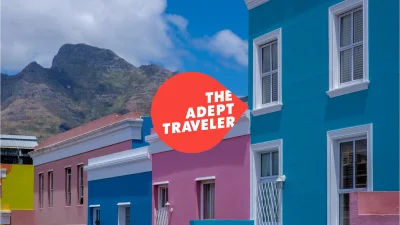Botswana

Travel to Botswana, and it's like being swept into a living canvas—one where the colors are alive, vibrant, almost smudged by the edges of reality itself. The golden hues of the Kalahari Desert stretch expansively, as if the earth itself decided to bask in eternal sunset, while the lush green of the Okavango Delta seems to breathe with each sigh of the wind, a paradox of water and desert. It's a symphony, you might say, of chirping birds and the distant rumbling of elephants, mingling in the air with that indescribable scent of the wild—Earth? Dust? Or is it something more profound, like the breath of ancient lands whispering their secrets? And the culinary scene—ah, come to think of it—it's peculiar how goat seswaa and mageu linger on your taste buds, a harmony both unfamiliar and warming, like a cozy unrehearsed lullaby. At times, Botswana feels like a mystery, doesn’t it? It makes you wonder if you’ve truly understood the layers of this enchanting tapestry. Then again, perhaps that's the beauty of it—such a place keeps you pondering, reflecting, yearning for the deeper stories yet untold. It has me contemplating the very act of writing, realizing how words strive to capture but sometimes just hint at experiences—much like a travelogue still in progress. Engaging in its journey might just spill new wonders with every step.
Botswana Travel Season
Travel to Botswana can be, honestly, a fantastic experience no matter the time of year, although one might argue there are certain times when it becomes an almost ethereal adventure. I mean, the way the seasons align just right—that’s when Botswana truly shines. Speaking of which, the peak travel season usually falls, predictably, between May and October. It's then that Botswana beckons travelers with its dry, relatively cool weather. During this period, wildlife is more concentrated around waterholes and rivers, offering some of the best safari experiences. In fact, come to think of it, the wildlife viewing is so enthralling you almost forget about the crowds. Well, that's a bit of an exaggeration. It can get quite busy this time of year; lodges often fill up and prices can be high.
But wait, isn't there something magical about visiting during the quieter months too? Enter the Green Season, which spans from November to April. Much lower tourist activity but, oddly, it's charm in abundance. The landscapes transform with rains, offering a freshness and vibrant greenery that’s simply picturesque. Wildlife is still very much present, albeit more dispersed—and newborn animals abound. Photographers often rave about this time because the light is beautifully diffused. Don't sidestep this time of year just because it’s off-peak; there’s a sort of peace in traveling when things are less bustling. Come to think of it, I might even prefer that.
Beyond seasonality, one can't ignore the charm that comes with local events. During the winter months, there's the annual Kuru Dance Festival, a hidden gem where travelers can witness San cultural expressions that are both ancient and astonishingly vivid. Little pockets of culture emerge in unexpected ways. Then again, does everything need to revolve around big festivals? Not everyone insists on that. Some travelers, weaving through quieter places, might find even the smallest interactions to be rich, immersive experiences themselves.
Perks of off-peak travel? Besides fewer crowds, you might find a sort of gentle intimacy when traveling. More personalized encounters, flexible itineraries, and sometimes better rates on safaris and lodgings. However, if I pause and reflect, those planning Travel to Botswana purely for landscape viewing might find some road conditions challenging due to rain. Yet I think, wait, but that's part of the adventure, right?
Overall, deciding when to travel to Botswana is a decision worth pondering over a second cup of coffee—or should I say, a Botswana brew if you're there? Not every decision has to be made quickly or with absolute certainty. That's part of the enjoyment. So, whether you prefer the bustling scenes of the peak season or the subtle beauty of the off-peak months, think about all these nuances that create a unique story. It’s odd, really, how writing about travel makes me want to explore every little detail. It’s like navigating through the winding thoughts of what makes each season distinctive.
The Weather and Seasons in Botswana
When you think about travel to Botswana, it's probably the wildlife safaris and endless horizons that you picture first, right? But the weather in Botswana—ah, that's a story in itself. It's like a personality with layers, changing moods, and yes, even mood swings. Okay, let's get into it.
Summer: Navigating Heat and Thunderstorms
So, summer in Botswana runs from November to April, which might sound weird if you're coming from the northern hemisphere. During these months, temperatures can soar up to around 104°F (40°C), which, let’s be honest, is pretty intense. It's not just about the heat, though. It's also when the rains come down, often in dramatic, thunderous bursts. These aren't your mild, gentle rains; they arrive in quick, sometimes chaotic, downpours. It's as if the sky couldn't wait any longer to release its hold and just decided to let it all go at once.
Now, this rain season is a mixed bag for travel to Botswana. On one hand, the landscapes transform, vegetation flourishes, and there's this freshness to everything—like nature hitting a reset button. But then again, roads can be a mess, and the wildlife can be tricky to spot since waterholes are plentiful and animals roam freely.
Winter: Cooler Days and Clear Skies
Alright, so when you hit May to October, you're in winter territory. Sounds chilly, yeah? Well, not exactly. Daytime temperatures are pretty comfortable, ranging between 68°F and 77°F (20°C and 25°C). It’s like a warm hug, really. Nights, though, they're not as forgiving. Temperatures can dive to around 41°F (5°C). Imagine having to layer up after an easy-going day, right?
Here's the thing: winter is arguably the best time to travel to Botswana if you want to see wildlife galore. The dry season means animals gather around remaining water sources, making them easier to spot. Plus, the skies are generally clear, letting sunsets scatter colors like an artist gone wild.
Spring and Autumn: The Transitions
The transitional seasons—spring and autumn—are, if you think about it, like the merest whispers between hot summers and mild winters. They’re brief, yes, but they matter. Temperatures in these in-between stages hover comfortably between 77°F and 86°F (25°C and 30°C). Picture pleasant breezy evenings with just enough warmth to make everything feel just right.
Travel during these months? Honestly, it's more about timing. The rains have either just settled down or are about to pick up. You might find green landscapes without the drenching rains, or dry paths where animals gather. An unpredictable beauty, if you will.
Reflections on Planning Your Travel to Botswana
Thinking about the weather when you plan your travel to Botswana is like tuning into a story with unexpected plot twists. You start with expectations, but honestly, you might end up discovering something entirely different. Consider the pulsating heat, the unpredictable rains, and those cold nights—it all adds this rich layer of experience that’s hard to find elsewhere.
Come to think of it, why am I just sitting here writing about it when I could be there, experiencing the rawness? But then again, this whole musing about the weather, it makes you realize how much it contributes to shaping the very essence of Botswana. Maybe planning a trip is as much about understanding these nuances as it is about actually seeing the sights. Odd, isn't it?
Accepted Payment Methods and Other Payment Information in Botswana
So, you’re thinking about heading over to Botswana, huh? A fascinating choice for travel, and, honestly, it’s like a hidden gem nestled in Southern Africa. First off, when you travel to Botswana, you gotta know about the local currency. We're talking about the Botswana Pula. Sounds cool, right? It’s abbreviated as BWP and is symbolized by a charming P. Quite straightforward once you get the hang of it.
Then there’s the deal with credit cards. Now, in Botswana, credit cards are widely accepted—at least the big ones are. Visa and Mastercard are your best friends here. American Express, though, well, let's just say it might feel a bit lonely sometimes. Not entirely a lost cause, but don’t bank on it being accepted everywhere. Discover? Yeah, that card might need to stay in the wallet—it's not the most reliable companion for payments in Botswana.
Cash—still a thing, believe it or not. When you travel through Botswana, especially if you're veering off the beaten path, cash is king. The Pula jingling in your pockets can save you at roadside stalls and local markets. ATMs to withdraw cash are plentiful in urban centers. Funny enough, thinking about it now, having some cash handy always feels like a traveler’s secret weapon. But hey, Botswana is not just about wielding cards and cash. Speaking of payments, one charming aspect of travel to Botswana is the tipping etiquette. Now, tipping isn't exactly mandatory but definitely appreciated. A little something for good service, like a 10% tip in restaurants, is welcomed warmly. It’s kind of funny—like you’re part of this unspoken dance thanking a person for their service .
When it comes to exploring this beautiful country, you start appreciating how different payment methods can either make you feel like a local or an out-of-towner. In a way, deciding between cash or card can be an experience in itself. But with all these options, it can get a bit overwhelming, right? Thinking about how everything seems interconnected. I mean, come to think of it, the availability of payment options really shapes your travel experience in Botswana in unexpected ways. Isn’t it odd how something as mundane as how we pay becomes part of the adventure?
Now reflecting further, one must expect varying levels of sophistication mixed with simplicity—it's such a fascinating contradiction. And yet, the deeper you delve into this, the more you realize how adaptable you become . So, when you're thinking of traveling to Botswana, whether it's for the stunning wildlife or the bustling city life, knowing your payment landscape makes a real difference. Or maybe it's just me musing over this while tapping away on my keyboard in a quiet room. I guess travel tends to invoke these thoughts. Perhaps next time, I'll jot down these ideas more coherently and... well, a pause to laugh at how scattered yet insightful the whole process feels. Hope this gives you a fresh perspective on navigating Botswana, with all its quirkiness and charm.
Why You Should Travel to Botswana
When you're thinking about travel, Botswana doesn't always jump right out, does it? But then again, if you really look into it, you'll uncover a place of breathtaking landscapes and unmatched cultural richness. I mean, just the vastness of the Okavango Delta alone, which I suppose is one of the highlights of travel to Botswana, captivates any adventurous spirit seeking the essence of wilderness. Imagine exploring these vast waterways by mokoro, a traditional canoe, quietly gliding past hippos and elephants. The serenity of the delta is, oh, it's really something that speaks to the soul.
Abundant Wildlife
Let’s not forget the incredible wildlife. Botswana is a sanctuary for a fascinating array of animals, making it a top destination for safari enthusiasts. The huge population of elephants in the Chobe National Park, just the sheer size of them, along with predators like lions and leopards, showcase the raw beauty of the African wildlife experience. It just—makes you feel small, in the best way possible. Travel to Botswana and you're likely to encounter the Big Five, which I think is almost a rite of passage for any safari lover.
Cultural Tapestry
The chance to immerse oneself in the Tswana culture and traditions is something that shouldn’t be overlooked when planning travel to Botswana. The warmth of the Batswana people, their rich, vibrant customs, and compelling history make for a hearty cultural experience. And now that I think about it, participate in the traditional dance, stories, and crafts, and you start seeing travel as a way of understanding life from a different perspective.
Sustainable Tourism
Botswana is known for pioneering sustainable tourism. It's, well, it feels good to know that visiting this country often means supporting eco-friendly initiatives that contribute to conservation and the well-being of local communities. Considering travel to Botswana involves being part of a movement towards preserving nature, it's kind of responsible tourism but on a bigger scale. Somehow makes every trip more meaningful, you know?
Changing Landscapes
The shifting landscapes from the lush greens of the delta to the stark, otherworldly beauty of the Makgadikgadi Pans provide quite an adventure for the senses. There’s something almost poetic about watching the sun set over the pans, painting the sky with hues you didn't even know existed. This whole place is like an artist’s dream, you can't help but feel inspired in every changing light.
Adventure Activities
It’s funny, when I talk about travel, Botswana might not always pop up for adventure sports, yet it offers quite the adrenaline-packed activities. Activities such as quad biking across salt pans and walking safaris make the experience ten times more intimate. Come to think of it, travel to Botswana for the adventure sports alone could be quite an eye-opener.
Genuine Hospitality
It’s not just the landscapes that are wild and vast—there’s an openness in the people that stays with you long after you leave. The hospitality is genuine, and it feels almost familial. I mean, Batswana know how to make you feel at home. There’s something about the shared stories, the communal meals, that make every interaction feel like a part of your travel story.
Birdwatcher's Paradise
Let me just, briefly, mention the bird life. Oh, Botswana is a paradise for bird watchers. With over 500 species of birdlife, the colors and calls are truly captivating. It’s like an orchestra conducted by Nature itself—exquisite yet effortless, and one might find themselves, camera in hand, capturing the vibrant splendor of this avian haven.
Disconnect to Reconnect
In today’s hyper-connected world, there's an odd sense of freedom in being able to disconnect. You see, travel to Botswana is somewhat synonymous with disconnecting from the daily grind, only to reconnect with something more primal—more real. No emails or notifications, just the thrilling call of a distant animal. Isn't it peculiar how removing yourself from connection makes you feel more connected?
Stellar Stargazing
The skies in Botswana, especially when night falls over the Kalahari, are breathtakingly clear. There’s this vastness, a splendor of stars and those constellations, almost overwhelming. While you might think it’s just stargazing anywhere, believe me, there's something about African skies that—actually, it boggles the mind when you experience it firsthand. Travel to Botswana, and you’ll quickly find yourself lost between thoughts of how small yet significant we all are amongst the stars.
The History of Botswana
Ah, Botswana. When you think of travel to Botswana, there’s this immediate sense that maybe—just maybe—you’re stepping into a land where history isn’t just something on display in museums, but it’s alive and breathing through the savannahs and deserts. In Botswana, history feels less like an ancient tapestry and more like an evolving story that’s constantly being written and rewritten. I mean, consider how this nation, relatively young if we think in terms of modern nation-states, underwent a dramatic transformation over just a few decades, moving from colonial rule to become one of Africa’s most stable nations. It's a country of contrasts and contradictions, far from static, emerging vibrant against the backdrop of its ancient land. And it’s odd that I think about it this way, but it feels right; like a history lover might find it quite compelling. Forging a connection between the many eras sprinkled across this land—yeah, that’s the draw.
Now, if we're talking landmarks (because what's history without a bit of drama?), you can’t miss the Tsodilo Hills. A UNESCO World Heritage site, these hills have over 4,500 rock paintings, a staggering visual record of cultural heritage dating back thousands of years. It feels like a place where you can almost hear whispers of the past if you close your eyes. The fascinating part is how these paintings aren't just artistic expressions but were integral to spiritual and daily life, intertwined with rituals and storytelling. Sometimes I wonder if these artists thought about their historical significance while painting, or were they just, you know, expressing life's chaos. But the evident artistry pulls you closer, as if history itself is speaking through those rock faces.
Of course, traveling to Botswana isn't just about its ancient echoes. Botswana has deftly turned its recent challenges and triumphs into a national identity that’s as textured as—and maybe even more fascinating than—the rock faces at Tsodilo. There's Gaborone, the capital city, a mash-up of cultures, ambitions, and modernity—a bustling urban scene set against sweeping landscapes. It's strange when you think about it, how a modern city can also act as the guardian of a nation's revolutionary past. The story of Botswana’s independence, its rise in the diamond industry, and its commitment to democracy offer essential insights into its present and future. It’s as if the city itself juggles the duality of a centuries-old traditional hangout and a modern metropolis.
As I type—what some might call a ramble—another thought pops in about Botswana’s wildlife, because, let's face it, it’s central to the country's allure. Chobe National Park and the Okavango Delta might come off as mere tourist hotspots, but they’re profoundly tied to the nation’s heartbeat. These lands have seen natural history written through migrations and adaptive animal behavior, and are perhaps where Botswana’s story is best told. It’s fascinating how nature dictates the rhythm of life here, intertwined with human history, with tales as old as time yet ever-evolving. As if man and beast tread the same ancestral path, constantly writing new journeys upon them. But, come to think of it, isn’t that how all good travel stories are? When history isn’t static, but alive—constantly alluring travelers to come explore its depths?
The Culture of Botswana
Have you ever thought about what makes Botswana truly special? It’s a place where contrasting ideas about tradition and modernity coexist, creating a culture as vibrant and diverse as the colors of the sunset over the Okavango Delta. I mean, the daily lives of the people are wrapped in customs that’ve been passed down through generations, yet there’s this hint of contemporary influences that weave in almost seamlessly. You can see it in the way people greet each other—it’s like this thing where respect and warmth merge in just a handshake, or perhaps the gentle clicking sounds in the Tswana language that punctuate conversations like a musical note. Or, maybe it's something completely different altogether. It’s a bit of both, I guess. Anyway, travel to Botswana, and you'll find a place where life isn't dictated by the non-stop hustle of the modern age, but by the rhythm of ancestral wisdom.
Now that I think about it, I can't help but mention the festivals. The Maun International Arts Festival stands out, drawing people not just from Botswana, but all over Africa. It's like everyone comes together and creates this wonderfully chaotic blend of creativity that's just, honestly, infectious! I reckon it's the perfect place for storytellers, artists, and performers—heck, for anyone who loves a good narrative told with passion. Oh, and the music! The thumping beats of marimba, or maybe the kora's sweet strings, echoing late into the night, they create this, well, ambiance that pulls you into the heart of African joy. It's something you have to feel to believe. And let’s not forget about the traditional Tswana dance. It possesses this energy and storytelling ability that connects everyone watching—and participating—in ways that words alone might not capture. Really, though, travel to Botswana, and you'll see it for yourself.
Let's look closer at how the diversity among the people in Botswana creates something uniquely theirs. It's not just Tswana people; there are many others, each bringing their threads to a cultural tapestry. Sometimes it’s hard to distinguish just where one tradition ends, and another begins. Ndebele, San, and Kalanga communities, all contribute, blending their customs, stories, and art forms. It feels like layers of rich history piling up to create an identity that is palpable yet ever-changing. This convergence of cultures—it makes Botswana this sort of living museum, where cultural encounters happen every day. But come to think of it, how do you preserve such dynamism? There are indeed preservation efforts, like the efforts to protect the San people’s traditional lifestyle. And that's something worth thinking about.
Actually, let's talk about art for a second. The craftsmanship is deep-rooted in tradition. There are these elaborate baskets woven by women of the Okavango region—each offering a glimpse into the skill passed down from mother to daughter, much like the oral stories told by the older generation. These baskets aren't mere objects; they're an embodiment of cultural expression. And the paintings, especially rock art by the indigenous San people—each stroke, a reflection of a historical chapter narrated on stone canvases across the Kalahari. So when you travel to Botswana, take the time to appreciate these quiet yet powerful expressions of culture. Travelers might wonder, do these art forms survive in an age of Instagram? But maybe that's the beauty of it; that tension between preserving the past and embracing the present is part of what makes Botswana what it is. Come visit, maybe you'll see what I mean.
The Culinary Experience of Botswana
Travel to Botswana, and you'll get more than just majestic wildlife and breathtaking landscapes. There's an entire culinary universe to explore, where traditional flavors meet modern influences. Botswana’s cuisine is grounded in simplicity and wholesomeness, which I find makes every dish feel somehow authentic, if that's the right word. Agrarian roots mean that locals have mastered the art of turning fresh, local ingredients into something truly special. There's a kind of rustic charm to it; think along the lines of traditional stews, grilled meats, and staple grains that, together, forge the culinary identity of the nation. One could say that Botswana's food is reflective of its landscapes—vast, untamed, and impossibly rich.
What are the must-try dishes that you ask? Sadza, or pap as it’s sometimes called, is this creamy maize porridge that feels homely and comforting. It’s odd that I think about it this way, but pap almost demands the accompaniment of a saucy, well-seasoned meat dish or those leafy green vegetables that sing of freshness. Then there's seswaa, a slow-cooked, shredded beef dish that draws you in with its simplicity—often just salt makes the short list of ingredients. If you venture further, you might stumble upon morogo, which, to be honest, is a bit of an acquired taste if you're not used to leafy greens with a slightly bitter edge. I wonder sometimes if people gravitate towards the nameless-they-maybe-local delicacies like bogobe, always expecting something exotic. But in Botswana, it’s the everyday food that tells the story.
The drink? Well, when you travel to Botswana, local beverages offer a fascinating journey all on their own—especially traditional drinks that are woven into the social fabric. Sorghum beer, or 'chibuku,' boasts a rich, earthy flavor that's distinct from Western bubbles. It kind of grows on you if you give it a chance. Meanwhile, Botswana’s wine scene has been emerging quietly but steadily, offering selections that might surprise you if you dare to step off the beaten path. And I’d be remiss not to mention St. Louis, the locally brewed beer that's arguably more mainstream—crisp and refreshing, it echoes the ‘good times’ promise of its advertisements.
Dining out leads you on another journey—a culinary safari of sorts. Street food markets pulse with energy, showcasing bites like vetkoek and chakalaka that might remind you of the tenacity and joie de vivre inherent in Botswana. I find that even in more polished, fine dining establishments, the focus tends to remain on those locally sourced, organic ingredients. It feels honest, perhaps to a fault, and some might say it's what differentiates Botswana's culinary scene. Special all-vegetarian or vegan spots haven't completely taken over yet, though there are generally some honest-to-goodness choices available; I can’t help but wonder if this aligns with a broader cultural preference for authenticity over trend-following. Food festivals? Oh, they're a vibrant celebration, often echoing the cycles of harvest or traditional ceremonies. It's as if, in those moments, the entirety of Botswanan culture gets served on a plate. It gives food an almost poetic context, and the more I dwell on it, the more it aligns with my idea of travel—be it to Botswana, a sensory and soulful adventure.
What to See and Do in Botswana
So you're planning to travel to Botswana? Perfect choice! Now let me think about it for a second, because when it comes to Botswana, there's just... oh so much to see and do. It's like every corner of this country has its little secrets and awe-inspiring places waiting for travelers to uncover. Maybe, just maybe, this vast and diverse landscape will make you feel so small, yet so connected to something bigger.
Safari in the Okavango Delta
The Okavango Delta. Quite simply, it's everything you'd imagine a safari in Botswana to be—untamed, sprawling, and profoundly alive. You’ll find adventures here that can’t be experienced behind the wheel of a truck. Picture yourself floating quietly on a mokoro, a traditional dugout canoe, as you glide past elephants wading through the waters and hear the distant calls of exotic birds. This place challenges your senses—making it seem as if you're walking through a page of National Geographic. Come to think of it, whether you’re an adventure seeker or someone craving serenity, the Okavango offers something... impossibly perfect.
Chobe National Park's Elephant Herds
Chobe, though, that's where you absolutely *must* go if elephants are your thing. With one of the largest concentrations of African elephants, this national park in northern Botswana is astounding. And don't even get me started on those river cruises! Drifting along the Chobe River at sunset is nothing short of magical. If elephants and sunsets could communicate to us—the two together, a rare kind of symphony. I mean, it's crazy how, sometimes, just being there can redefine how you view wilderness. It might be packed during the high season... but you'll find tranquility, even in a crowd.
The Cultural Tapestry of Gaborone
And if you believe travel isn't just about landscapes, then Gaborone is your cultural fix. This bustling capital city is full of surprises. You walk through its streets, and there’s an unexpected blend of urban progression and deep traditional roots. It’s a place where you can explore local art galleries or enjoy the vibrant food markets. Gaborone sometimes challenges your perception of what an African city should be like, giving solo travelers and families alike an engaging experience. Funny how cities like this defy simple categorizations, huh?
Living the Kalahari Experience
The Kalahari is one of those places that creep up on you, leaving an indelible imprint. What’s most surprising? The way this seemingly barren desert is actually full of life. Experiencing the stark beauty alongside the indigenous San people can dramatically shift how you perceive deserts—and maybe, even life. Their way of life, undisturbed for centuries, provides a potent insight into human resilience and adaptation. Every travel enthusiast should, at least once, stand in the Kalahari and contemplate—how does such an arid place sustain so much diversity? Come to think of it, travel in Botswana teaches you that surprises are inherently... unpredictable.
Bird Watching in the Mokolodi Nature Reserve
For all travel to Botswana, where else can one indulge in bird watching that's equally therapeutic and thrilling? Enter Mokolodi Nature Reserve, where over 300 species of birds paint the sky and the landscape a living canvas. Even if you’re not a hardcore ornithologist, there’s a serenity to just watching these creatures flit about. It might sound cliché, but losing track of time as you watch the graceful movements of flora and fauna—it's real here. Travel is funny like that, isn't it? It promises the unexpected if only we look closely.
Exploring Tsodilo Hills' Rock Art
The Tsodilo Hills isn’t just a site; it's a narrative waiting to unfold. Known as the 'Louvre of the Desert,' these hills are filled with mesmerising ancient rock paintings. Imagine standing amidst art that dates back over thousands of years, invoking stories whispered across generations. Reflect for a second—how something so old can communicate emotions that are still relevant today. Families with curious minds have much to explore here. It's almost as if the rocks speak in riddles, daring you to uncover their mysteries.
Desert Dune Thrills at the Makgadikgadi Pans
You wouldn't expect dunes in a place known for its pans, but that's the wonder of travel to Botswana—it's full of surprises. The Makgadikgadi Pans might seem austere at first, but the beauty of this bizarre landscape grows on you. Ever try riding a quad bike over these vast salt pans? It's an adrenaline rush like no other, with a seemingly endless horizon to chase. You start to wonder if travel isn’t just about reaching destinations—maybe it’s also about realizing how vast and strange our world can be. A definite must-try for adventure seekers!
The Rhythms of Maun
There lies the gateway to the Okavango, the bustling town of Maun. It’s here travelers can find a curious mix of tradition and modernity. You might find yourself wandering its streets, sampling local cuisines, or interacting with the warm-hearted locals. Maun teaches you something: to appreciate travel not for its destination alone, but for the community that brings vibrancy to it. It's such an eclectic place that it's difficult to box it into a category. Travel to Botswana should definitely include this, for real!
Walking with the Meerkats
Yes, meerkats. Near the Makgadikgadi Pans, there's an opportunity to meet these inquisitive creatures up close. Watching them scurry about their business is like watching the universe in miniature, a tiny slice of life that's acutely vivid. Families with kids find these kinds of experiences unforgettable—there’s a dose of humor and life lessons tucked into such simplicity. Travel sometimes teaches patience in unexpected ways. Who knew watching meerkats go about their toils could teach us about community and hard work?
The Grandeur of the Central Kalahari Game Reserve
Lastly, though not least by any measure, there’s the Central Kalahari Game Reserve. This marker of immensity and solitude gives travelers a sense of perspective—how life fiercely persists even in stark landscapes. Here’s a travel tip for Botswana: embrace the starkness, let the solitude talk to you. It’s a place where the vastness mirrors introspection, and every shadow has a story to tell. Honestly—and here’s something I rethink often—travel has this way of unearthing quiet truths, doesn't it?
Tips & Tricks for Traveling in Botswana
Embrace Local Customs and Traditions
Travel to Botswana, and you might feel an overwhelming excitement to dive right into what the country has to offer. But here's the thing, slow down and take a moment to understand local customs. Greet people with a handshake—it’s polite. But don’t just shake hands; keep it firm yet gentle, not a limp fish, definitely avoid a bone-crusher. Traditionally, it’s common to address someone older with respect, as "Rra" for men and "Mma" for women, reminiscent of a more deferential time. It’s odd that I think about it this way, but understanding these cultural nuances can make your interactions feel more genuine. Engaging with these customs isn't just about respect; it's an opportunity to immerse yourself in the everyday rhythms of life there.
Choose Your Safari Wisely
When you think about travel to Botswana, safaris are probably the first image that springs to mind—like an instinctive association. And while you could just book any old safari, you really should think about what type of experience you want. Consider group size. Some people love the camaraderie of larger groups, chatting while spotting wildlife. But personally, the idea of a small, intimate group where you can hear the wind and not just other voices is appealing. Plan for the season, too. Want to see the elephant herds? Well, the dry season from May to October is ideal. Oh, and another thing, if you love photography, pack that zoom lens! Trust me—well, don’t just take my word for it—photography in Botswana is incredible, with landscapes and colors you can’t find anywhere else.
Know Your Transportation Options
Traveling within Botswana can be, how to put this, an adventure of its own? You’ve got options, lots of them. Of course, self-driving folks might think renting a 4WD is a no-brainer, and perhaps it is—given the terrain. But, I'd say, what about public transport? It's not always the most reliable, admittedly, but it offers a slice of local life you can’t get from behind the wheel. Then again, for those who are thinking of flying, Air Botswana has decent domestic flights, so long as you're planning in advance. The roads, ah, some are great, others not so much. So weigh these options based on how comfortable you are with uncertainty, or maybe it's spontaneity I’m thinking of.
Botswana's Currency and Budgeting
The Pula, which—come to think of it—literally means "rain," is the currency; and there's something almost poetic about that. It's strong, stable even, akin to the country's economic standing. Budgeting, now there’s a little dance of its own. You could splash out in luxury lodges and safaris, or you might prefer to stretch your budget with some clever navigation of guesthouses and markets. By the way, you can get some really good deals if you avoid tourist peak seasons—I didn't mention that earlier, did I? It’s worth considering that credit cards aren’t universally accepted, so keep some cash on hand. Or not, if you're feeling adventurous with digital transactions wherever you delve into day-to-day purchases.
Diversify What You Eat
While immersing yourself in Botswana, don't just stick to the familiar. Try the local food—it’s a way to experience the country's flavors and stories. Taste Seswaa, a beef dish that, despite its simplicity, carries a depth you might not expect—cooked slowly, traditionally pounded, and delightfully rustic. Maybe peppered with some guilt-free nostalgia, I have to confess, it's a personal favorite. Market stalls offer local treats, you know, like magwinya, which are basically little dough balls of happiness. Actually, some places you go might just win your heart through your stomach, if that makes any sense. Food sometimes offers a surprising connection to place, so don’t miss that chance to dig in!
Respecting Wildlife
Botswana's wildlife is incredibly diverse—you kind of feel a silly sense of wonder, like when you spot animals roaming freely, existing without fences or boundaries. Listen, it's not just about snapping pictures or checking species off a list. Respect the creatures you encounter. Don't approach too closely, even though the urge to lean in for that ‘perfect shot’ is tempting, downright irresistible even. Local guides usually know best, so heed their advice on safe distances—you know, for your safety and theirs. Sometimes, taking a step back—figuratively, or literally—allows for a more meaningful interaction with nature. After all, isn't the unpredictability of the wild what makes it wondrous?
Photographers’ Paradise
If you're travel-enriched by photography, then, oh, Botswana is your garden of Eden—or at least it should be. With the right timing, the golden hour in the Okavango Delta will paint landscapes you might think only existed in dreams. Get up early; you won't regret it. Some shots, though, they aren't about anymore perfecting technique but feeling precisely that moment when everything clicks. Avoid the midday harsh lighting when planning for wildlife photography, or just all photography in general. And hey, your best tool here? Patience. It sounds almost trite saying it, but true beauty waits for those willing to tune in, or hold a gaze just that moment longer.
Solo Travel in Botswana
Traveling solo can be, ironically, a deeply connective experience. In Botswana, safety isn't a literal matter; it’s about feeling at ease in your own company and surroundings. You might worry about loneliness, yet paradoxically, the solitude can give you a heightened awareness of your experience. The people of Botswana are friendly, sincerely warm—and conversations, sometimes with strangers, become companions. Keep your wits about you, though—common sense is your best buddy here, as with anywhere. You’ll probably realize that venturing off on your own isn't just about being alone; it's about savouring every facet of the journey as it unfolds just for you.
Off-Peak Travel: An Underrated Choice
Here's a tip: consider traveling off-peak. Put away those assumptions that a trip to Botswana is only magical during the high season. Sure, most people think visiting from May to October is a safe bet because it's dry, and wildlife viewing is spot-on. But, picture this: the greenery post-rainfall from the less beaten trail of November to April offers a fresher, lush view, less crowded and—dare I say—adds a tinge of exclusivity to your experience. Okay, there's likely rain, but it paints the landscape with a vividness you can't capture when everything is uniformly dry. Well, maybe I’m a sucker for the unexpected, but hey—it’s worth reflecting on before booking those tickets.
Engage with Local Art and Craft
Come to think of it, traveling isn't merely about seeing but about engaging with the culture in a tactile, personable way. Botswana’s art and craft scene isn't downright bustling, but it's rich with history and stories. Take a moment to visit local markets and galleries. Here’s another thought: that woven basket or intricate piece of jewelry isn’t just a souvenir—it's a piece of someone's narrative and craftsmanship. Sometimes you might feel you only came for the safaris, but slow down, wander, and discover these authentic forms of expression. The art isn't just there to lure tourists; it’s a meaningful, genuine reflection of the nation’s soul.
What To Know Before You Go to Botswana
Ok, so you’re thinking about travel to Botswana. I mean, why not, right? It's one of those places that feels both off-the-beaten-path and yet so inviting. Anyway, what do you need to know about travel there? Well, let’s talk about entry requirements first. A visa might be on your list, depending on your nationality. Citizens from many countries, like the U.S. and most of Europe, can get a visa on arrival for short stays, but double-checking with the Botswanan consulate is always a smart move. Just in case, you know?
On the health front, yellow fever isn’t really a concern unless you are coming from an area where it's prevalent, but vaccinations like hepatitis A and B, and typhoid are often recommended. Malaria is present in some areas, especially if you're venturing into wildlife-heavy zones like the Okavango Delta. Anti-malarials could be a good idea. I mean, better safe than sorry, don't you think? Oh, and since we’re on it, travel insurance should cover medical evacuation, just in case.
Let’s jump to local customs and etiquette. It's, it's one of those things that just makes travel richer, don't you think? Kinda understanding people beyond the guidebooks. People in Botswana are generally warm and friendly, and a simple handshake with direct eye contact is a polite way to greet. But maybe don’t go shaking hands left and right before assessing the vibe of the conversation. Also, respect for elders is really important, more than some might realize. So, being a bit formal can go a long way.
When you're thinking of getting around—transport-wise—you’ll find there's more than one way to travel across Botswana, and it mostly depends on your destination. In cities like Gaborone, taxis are common, but for remote areas, self-driving in a 4x4 can be both required and adventurous. The idea of traveling through those vast landscapes, musing on their beauty and unpredictability, well...it's something, right? Though public transport might not always be punctual or comfy, it comes with its own quirks and moments that sort of add to the travel narrative.
Speaking of moments, let's talk tipping. Boxed into the service industry culture that we've seen around, but not quite as compulsory. In Botswana, tipping is appreciated but not obligatory—about 10% is fine at restaurants. But if someone's gone above and beyond, I think it's nice to share a little gratitude through tipping, if you ask me. Actually, doesn’t it sometimes feel awkward when you're unsure if tipping is expected? Funny how these small things weigh on us when we travel.
As for language—now here’s a twist—English is actually the official language in Botswana, but most people speak Setswana as well. So if you're considering picking up a few words to connect on a deeper level, that might be quite rewarding. Just saying "Dumela" for hello, or "Ke a leboga" for thank you can make interactions more personal. It's kinda like inserting small meaningful gestures into conversations that make travel all the more interesting. Connecting through language—even a little—can bridge worlds.
And now, just randomly, when I think of travel, the zest of unpredictability kicks in. Travel isn’t just about moving from one place to another, but about embracing uncertainty and surprise. I mean, travel to Botswana throws you a curveball in the best way, as each unexpected encounter and experience meld into a narrative uniquely yours. Life, like the paths you find yourself on there, doesn’t always need a map, come to think of it.
Accessibility in Botswana
Traveling to Botswana can be an incredibly rewarding experience. With its breathtaking landscapes and rich wildlife, this country offers so much to explore. Now, when thinking about travel to Botswana—especially for someone who might have specific mobility needs—it gets a bit more nuanced. Come to think of it, one might wonder how this stunning place accommodates individuals who use wheelchairs or have other physical challenges. To start, physical accessibility in Botswana is something of a mixed bag.
Some areas and hotels have taken strides in providing ramps and accessible facilities. However, it's really something you’ve gotta check in advance. Many lodges are set in remote locations to maximize that adventure vibe, right? Often, these aren’t quite tailored for wheelchair access, but others are making progress. Now, surprisingly perhaps, some larger hotels in cities like Gaborone are pretty well-equipped with facilities like wider doors and elevators—something thoughtful travelers should be aware of.
Now, about public transportation. I'd say it's a bit of a challenge in Botswana, especially for those who rely on wheelchairs or have limited mobility. It’s not exactly easy. The standard buses aren't typically designed with ramp access, and taxis, well, they vary a lot in terms of drivers' willingness to accommodate. Alternatively, it's worth noting that private transport options, like specific transfer services, sometimes offer vehicles that are more accessible. Maybe a necessity when planning your route.
Accommodations and Adaptations
When we think of accommodations in Botswana, it’s crucial to mull over the variety, from fancy resorts with all the usual bells and whistles to more rustic lodgings. And, let's be honest—there’s quite a range here. Some major hotel chains in bigger towns provide accessible rooms equipped with visual alerts for hearing impairment, visual signaling devices, and aids for those with auditory challenges.
Musings on visual experiences; visiting Botswana if you have visual limitations factors in some considerations too. While there may not be tactile maps or Braille materials widely available, those breathtaking panoramic scenes and sounds of the wild are a full-sensory trip anyone might enjoy. However, tour guides and tour operators can offer tailored experiences with descriptive audio guides tailored to enhance the visual offerings.
Accessible Attractions
Thinking on specific tourist attractions, the Okavango Delta is a must-see, but it’s relatively untouched, so one needs to plan ahead for accessibility opportunities. The Makgadikgadi Salt Pans—these vast surreal landscapes have mesmerizing vibes that can be approached, but with caution for access. Strange as it is, nature doesn't always accommodate our needs, yet the physical beauty of Botswana offers something deeper—a connection that transcends these barriers.
Chobe National Park is more inclined toward offering accessible safari experiences, with some tour operators customizing safaris for travelers with limited mobility. It's ironic in a way—such a wild, remote environment offering accessibility where we least expect it. And come to think of it, isn't it fascinating how travel to places like Botswana stretches our definitions of accessibility and adventure?
Reflections on the Journey
So, in the broader scope of travel to Botswana, the journey into this beautiful region requires perhaps a bit more planning, especially for those with specific accessibility needs. But isn't that the same as unraveling the layers of a compelling story, or sorting through thoughts as I write this? It's an interesting challenge, figuring it all out. Or maybe, finding out how it's really about seeing beyond the barriers and diving into the heart of what makes Botswana such an alluring story worth exploring.
Health & Safety in Botswana
Travel to Botswana is one of those adventures that’s on my bucket list, and, honestly, its beauty kind of catches you off guard. You get this romantic vision of endless savannas and the Okavango Delta sprawled out like some incredible watercolor painting. However, when thinking about the nitty-gritty of planning such a trip, I guess it's only natural to start weighing in on safety concerns, right? I mean, traveling, especially somewhere as exotic as Botswana, does bring up questions that can't be ignored. It’s funny how our mind immediately jumps to the worst-case scenarios, almost like it’s preventing us from having too much fun.
Water Safety
Water is the essence of travel to Botswana—or any adventurous locale, really. But, now that I think about it, the World Health Organization and CDC do suggest caution when it comes to drinking tap water in Botswana. Bottled water is your safest bet. At least, that’s what I'd suggest if you're planning to sip on something other than gin and tonic during your safari! Even brushing your teeth can become a strategic mission, one of those travel tips people often forget about 'til they're already abroad. It's prudent to be cautious—think of it as respecting the terrain you're traversing.
Natural Disaster Risks
Now, coming to the thought of natural disasters, I must confess that Botswana is sort of blessed in this regard. Unlike regions that face tumultuous weather patterns, Botswana doesn't frequently deal with earthquakes or massive storms. But hold on a sec—before you become too complacent, consider the flooding in the Okavango Delta during rainy seasons. It’s strange; we call it a “disaster,” but to the Delta’s ecosystem, maybe it’s just Tuesday, right?
Crime and Safety
Okay, let's talk crime and safety. Traveling to Botswana isn't like writing a mystery novel; you're not necessarily looking over your shoulder at every turn. But, petty crime exists. Pickpocketing, theft—these aren't strangers to any traveler. Urban centers, like Gaborone, have their fair share of opportunistic thievery. The sensible move? Keep your belongings close, and, you know, a money belt isn't the worst invention ever. Come to think of it, walking with an air of confidence does reduce your odds of being targeted. Or maybe I tell myself that just to feel less paranoid?
Political and Social Climate
Regarding the political sphere—Botswana maintains a pretty stable government, unlike some neighboring regions. It’s intriguing how stability can offer such peace of mind when traveling. But, it seems, and let me just reflect for a moment here, like political climates shift as easily as the desert sands. So, keep an ear to the ground, perhaps? I wouldn’t dive headfirst into any political discussions while there, though. Just a thought.
Health and Vaccination Precautions
If you're pondering over health and vaccinations—which, to be honest, I often conveniently forget to consider until the last minute—there's a bit to unpack. Routine vaccines are always smart; but also, Hepatitis A, B, and Typhoid are recommended if you plan to explore places where sanitation isn’t top-notch, which, let's face it, can be part of the raw, unfiltered charm of the adventure. And malaria? Another consideration if you find yourself meandering through the lush, mosquito-inhabited zones. Access to healthcare is decent in urban areas; although, rural spots might—unexpectedly or not—challenge you in this regard. But then again, isn't that part of the story you tell later?
Travel to Botswana can truly be mesmerizing—an experiential blur of majestic landscapes and cultural depth. But, isn't it curious how much thought goes into preparing for the unexpected? Almost feels like preparing, just in case something challenges the narrative we’ve constructed. There’s so much to contemplate with each new journey, a traveler's tapestry woven with threads of adventure and caution. Who knew avoidance could be such an art form?
Other Places You Might Like
Okavango Delta, Botswana - Ah, the Okavango—one of those otherworldly places where a simple mention invokes images of vast, sprawling waterways, teeming with life. There’s something deeply mesmerizing about watching elephants wade across its channels or seeing the sun cast a golden hue across its shimmering waters. But, where do I even start when it comes to talking about the Okavango? It’s kind of like a painting that transforms every time you glance at it, finding something new and extraordinary hiding in plain sight. People who love Botswana feel drawn to these moments of tranquility yet adventurous uncertainty within this watery labyrinth.
Kruger National Park, South Africa - Slightly different vibe from Botswana, sure, but Kruger has its own kind of magic. It’s a bit more rugged, maybe, less about serenity and more about raw, untamed nature in all its glory. That’s the thing about Kruger; it’s vast, challenging, and full of surprises around every bend. You know, the kind of place where you’re constantly in awe and maybe even a little on edge in the best way possible. While Botswana offers that quieter, immersive wilderness, Kruger throws you into the thick of it. And there’s something to be said about the interaction between human curiosity and wild unpredictability.
Serengeti National Park, Tanzania - The Serengeti, plain and simple, is iconic. When you think of travel to Botswana, you think of pristine, serene landscapes, but here, you get this insane mix—a bustling kaleidoscope of life where the dramatic dance of the Great Migration takes center stage. Imagine the heart-pounding thrill of witnessing vast herds of wildebeest and zebra like an unfurling wave on the horizon. It’s sort of like comparing poetry to a thriller; both have their wonders but pull at different strings. The excitement in the Serengeti comes from its grand gestures, its chaotic elegance—an ideal juxtaposition to the quieter introspection found in Botswana.
Lamu Island, Kenya - You might find it weird that I’m linking Lamu to the wilds of Botswana, but hear me out. When you close your eyes and you picture Botswana, you're met with endless horizons and a whisper of tranquility. Likewise, Lamu offers a kind of serenity that’s rare in today’s fast-paced world. Walking through its narrow streets, perhaps you’ll imagine you can hear the past whispering its secrets. There’s a rhythm here that contrasts the vast expanses of Botswana, yet it complements that deep sense of peace and timeless connection to place.
Etosha National Park, Namibia - It’s curious—an arid land brimming with more life than seems possible at a glance. Etosha draws those who are captivated by Botswana’s spell, offering a backdrop that is as stark as it is stunning. There’s something undeniably soul-stirring about witnessing wildlife converge upon the dusty salt pans. Where Botswana captures your heart, Etosha challenges your perception of what wilderness starkly demands. Here, the stark white ground underfoot tells stories of endurance, and if you stand quietly enough, you might just hear it breathe.
Hwange National Park, Zimbabwe - This might seem like an expected choice, but Hwange shares a kind of kinship with Botswana. It’s a place where you feel the heartbeat of the savannahs, pulsating with the rhythm of the wild. The draw here lies not just in its rich tapestry of wildlife but also in the silent, untold connections between man and beast. When I think about Botswana, I similarly imagine a delicate thread weaving through the human spirit and the wild unknown. Somehow, reflecting on why I feel this way about Hwange—a place I might not instantly connect with Botswana—weaves a fascinating narrative, unexpected yet profoundly sensible.
Final Thoughts
So, why is Botswana this bewitching destination? Oh, there are so many reasons. You know, when we think of travel to Botswana, it's like we're thinking about this untouched corner of the world—a place where nature simply flourishes. Let's not forget the Okavango Delta. Who wouldn't want to see the delta, teeming with wildlife, right? I mean, it’s like entering another realm. Or maybe it's the idea of these vast terrains where elephants can roam free. Plenty of elephant magic, I guess you could say. Does that sound cheesy? Maybe, but check it out for yourself. You'll see.
There's also this feeling—an appreciation, actually—for the people. The kindness around every corner leaves an impression. It's kind of hard to articulate, you almost have to be there, you know, breathing the air, meeting the locals. Truth be told, sometimes I wonder if I romanticize it too much. But then, that's what travel does, right? It's about getting lost in those moments that seem utterly 'of-a-different-world' even though you're very much on this planet. Botswana offers all of that, all the time.
Come to think of it, there's a timelessness about Botswana. I should’ve mentioned that sooner. Travel there and you'll see what I mean. It’s odd to think of time in such a linear way. So, isn't it exciting when a place totally messes with your perception of time, even if just for a little while? Like, picture the sun setting over the Kalahari Desert. It's a scene where time almost stands still. And you’re just there, soaking it all in.
Okay, I know, I know, maybe my bias is showing a bit, but isn't authenticity magnetic? Capturing what makes travel to Botswana unique demands more than just words...—it's an experience that starts to change you before you even realize it. Isn’t that just the essence of travel, anyway? A destination that beckons with promises of transformation, if you're willing to embrace it. So go on, consider Botswana for your next journey. Who knows what stories you'll bring back? Or maybe, more precisely, how you'll come back changed.
Chobe National Park, Botswana

Gaborone, Botswana

ATTA 2026 Africa Travel Trends Report Highlights

New Routes Boost Southern Africa Safari Flight Links

Portugal Long Haul Flights Get TAP Premium Economy

2028 World Cruise From Miami To Athens With Azamara

UAE Africa Tourism Plan To Fund $6 Billion Projects

Regional Airline Cancellations Hit African Hubs
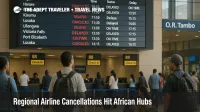
Flight delays and airport impacts: October 8, 2025

Mozambique Lowers Advisory, but Northern Hotspots Persist
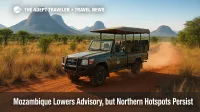
Intrepid Travel Mystery Tour Promises 14-Day African Adventure
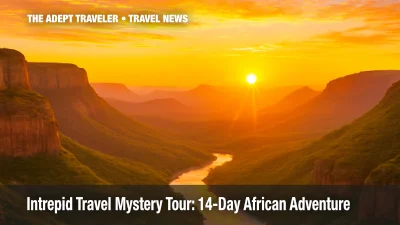
How The Gambia Is Turning Trails and River Cruises into a Model of Sustainable Tourism
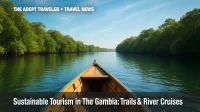
Africa Emerges as Top Destination for Adventure Tourism
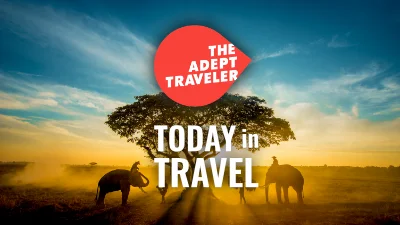
Seabourn's New Luxury Land Excursions for Africa Voyage
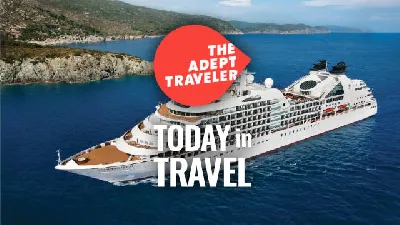
Princess Cruises Reroutes 2025 Voyages Away from Red Sea
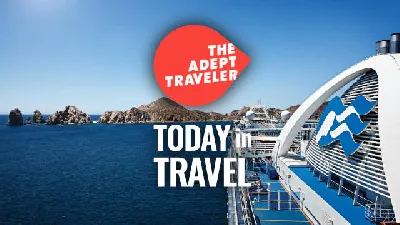
Seabourn's Grand Africa Voyage: A 90-Day Adventure Around the Continent

Discover the Ultimate Luxury Cruise in Africa, Vegas Hotel Transformation & Juneau Cruise Control

Regent Seven Seas Cruises Unveils New Grand Voyages for 2025 and 2026

Travel News: Disabled Travel, Safari's, and Australian Cruises

Is It Safe to Drink the Water in Africa? Comprehensive Guide
